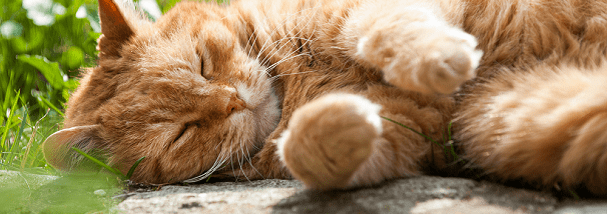 As standards of veterinary care and diet improve, our cats are living longer. Their dietary and body changes and requirements are understood well, but what about their emotional and behavioural needs?
As standards of veterinary care and diet improve, our cats are living longer. Their dietary and body changes and requirements are understood well, but what about their emotional and behavioural needs?
What happens to my cat's behaviour as he or she gets older?
The most common behaviour seen in older cats is going to the toilet outside of the litter box or in the house, and/or spraying. This problem is often due to an underlying medical condition so the cat should be examined by a vet. If not a medical condition, other reasons for this behaviour may be that your cat doesn't want to go outside. Perhaps other more aggressive cats are hanging around, or because they are more sensitive to harsh weather conditions. An indoor litter tray is likely to solve this problem, but the tray should have low sides to accommodate your old puss's stiff joints. Be sure to change the litter regularly and try different types to see which one they prefer.
Another problem of the older cat, is that they are more prone to stress. Older cats don't usually handle stress as well as younger cats. Stress factors include moving house, changes in routine and changes in family members (maybe you've just had a baby, or bought a new kitten or puppy) – these can all cause toileting inside the house! Reducing these stress factors will help your cat feel better. If you are moving house, make sure your puss is moved quietly and that their favourite bedding and familiar food, water and litter box are used in the new house.
Many cats become aggressive or anxious as they age. This may be due to a medical problem such as pain (for example arthritis), or loss of vision or hearing, which results in the cat being easily startled or frightened. Arthritis can be very painful, and inhibits the cat's ability to run and jump.
Appetite also lessens with age, due to the cat's decreased taste and smell. Dental disease is common, which also leads to less frequent eating. Cats may lose weight and become more prone to bowel problems, such as constipation.
It is well noticed that cats become more yowly and vocal as they age, and often more demanding! Older cats may cry or call, especially at night. Deafness is thought to play a role in the harshness of the cry. Like people get Alzheimer's, older cats can suffer from senility and short-term memory problems, causing general confusion at night. Be sensitive to what your cat is going through and give him or her lots of care and attention.
Being more vocal at night may be an indication of hyperthyroidism (increased metabolic rate), which can also contribute to weight loss and other things – so it's really important to see your vet if you suspect this may be a problem. Other causes of vocalisation include dental pain, high blood pressure and kidney disease.
As cats become older, they also sleep more. This includes any sleeping, from deep sleep to cat naps to dozing. Older cats go out less, explore less and generally do less, giving them more time to rest and sleep.
Older cats are more sensitive to the cold. Their favourite place to sleep will most likely be near a heat source, such as a radiator or warm pipe. As cats age, they may feel colder, or even suffer hypothermia in some cases.
As cats lose weight, they become more boney, so will look for soft, cushioned places to rest.
The older cat's fur is not how it used to be, so their coat is less resistant to cold and wet. Also their grooming habits change – they groom less, or don't groom as well, because any stiff joints make it hard for the cat to be flexible enough to reach those fiddly areas, in particular the base of the spine which can become mangled.
How can I help my cat be more comfortable in old age?
Sadly chronic illness is a big factor that can affect the older cat's behaviour. For example, a kidney problem will make the cat drink more, and deafness will make the cat more vocal. Common illnesses in the older cat include:
- Arthritis
- Chronic renal failure
- Deafness
- Blindness
- Hyperthyroidism
- Bronchitis
- Dental problems
If your cat is exhibiting any symptoms, for example weight loss, appetite changes, reluctance to jump up, changes in sleep, smelly breath – please come and see us! We want your cat to be happy and comfortable well into old age! It is best to treat any illness as soon as possible, be that to cure it or control and manage it to ensure a high quality of life. We have had enormous success with state of the art laser therapy. Old cats may come and see us for a series of laser treatments, in particular for arthritis.
Some ideas to look after your older puss cat:
- Provide plenty of warm, soft, quiet sleeping places for the cat to spend most of its time
- Keep these resting places as low as possible to cater for arthritic joints
- Groom them often, particularly round the base of the spine where they may struggle to reach
- Try and keep to routines to reduce stress
- Play games to maintain mental wellbeing
- Consider having indoor litter boxes if your cat doesn't like going outside much anymore
- Give them an old age diet, such as Royal Canin Senior, which helps to protect the kidneys. You can buy this at either of our clinics
- Try and be sensitive to your older cat and what they are going through both physiologically and psychologically
Of course, like people, all cats are individuals and cats will age differently. Some may be perfectly fine their entire life. Come and see us to help judge if your cat is 'senior'.
Cats are sweet creatures and caring for an older cat is one of the most rewarding things you can do. Excellent vet care and small adaptations to your home can improve your cat's quality of life for many more years.
We would love to see you and your senior feline friend, so if you have any concerns please do call or message us to book an appointment. You can register your pet online to get 20% off your cat's first consultation.


